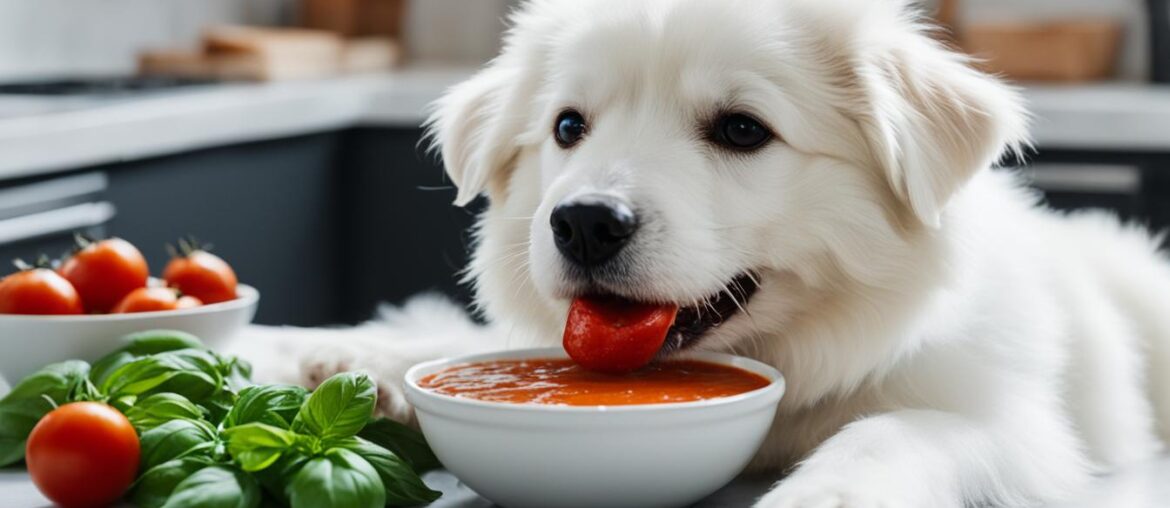As a responsible pet owner, you want to ensure that the food you give to your furry friend is safe and nutritious. One common question that arises is whether tomato soup is safe for dogs. While tomatoes themselves can be a healthy addition to your dog’s diet, it’s important to understand the potential risks and consult with your veterinarian before offering tomato soup to your canine companion.
Key Takeaways:
- Consult with your veterinarian before introducing tomato soup to your dog’s diet.
- Ripe tomatoes are generally safe for dogs, but unripened tomatoes and the stems should be avoided.
- Tomato soup may contain ingredients that are harmful to dogs, such as garlic, onion, and excessive salt or sugar.
- If feeding tomatoes to your dog, always remove the stems and cut them into small, digestible pieces.
- Monitor your dog for any adverse reactions after eating tomatoes, and seek veterinary care if necessary.
Can Dogs Eat Ripe Tomatoes?
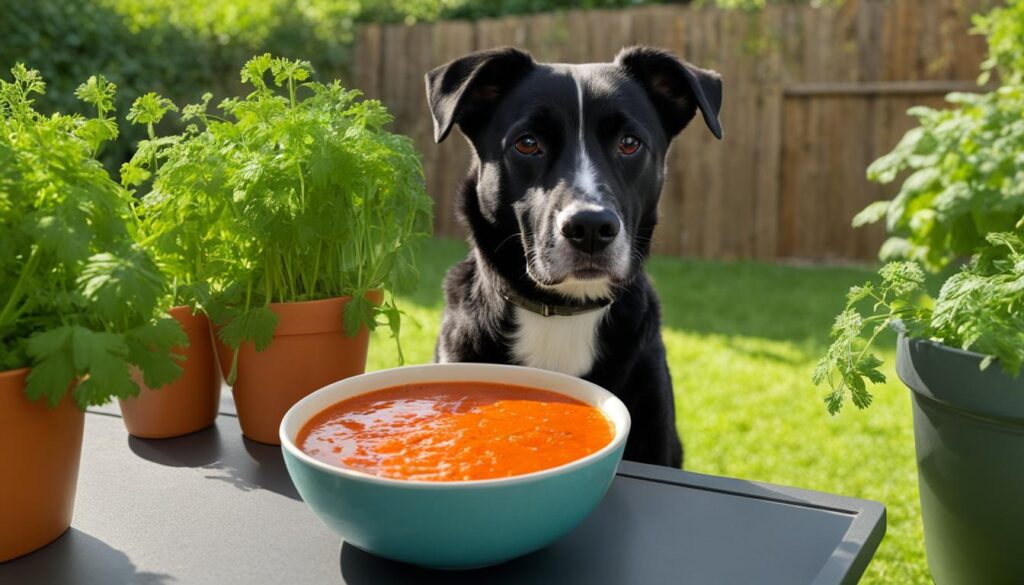
Ripe tomatoes are generally safe for dogs to eat, including tomato soup made with ripe tomatoes. Ripe tomatoes contain essential vitamins and minerals, such as vitamins A and C, potassium, and antioxidants, which can support immune health, muscle function, and reduce the risk of illness. It’s important to note that the myth that tomatoes are harmful to dogs stems from confusion around tomatine, a compound found in tomatoes. However, the amount of tomatine in ripe tomatoes is not significant enough to cause harm to dogs.
Dogs can enjoy the nutritional benefits of ripe tomatoes, which can be served as a healthy addition to their diet. However, it’s crucial to prepare tomatoes properly and feed them in moderation, based on your dog’s size, age, and dietary needs.
Here are some key points to remember when feeding ripe tomatoes to your furry friend:
- Choose ripe tomatoes that are fresh, firm, and of high quality.
- Wash tomatoes thoroughly to remove any dirt or pesticides.
- Remove the stems and leaves of the tomato, as they can contain higher concentrations of tomatine.
- Cut the tomato into small, bite-sized pieces to make it easier for your dog to chew and digest.
- Introduce tomatoes gradually into your dog’s diet to monitor any potential adverse reactions.
- Limit the portions of tomatoes to ensure they make up no more than 10% of your dog’s daily caloric intake.
By following these guidelines, you can safely incorporate ripe tomatoes into your dog’s meals or homemade recipes. Always consult with your veterinarian before making any significant changes to your dog’s diet or introducing new foods.
Can Dogs Eat Unripened Tomatoes?
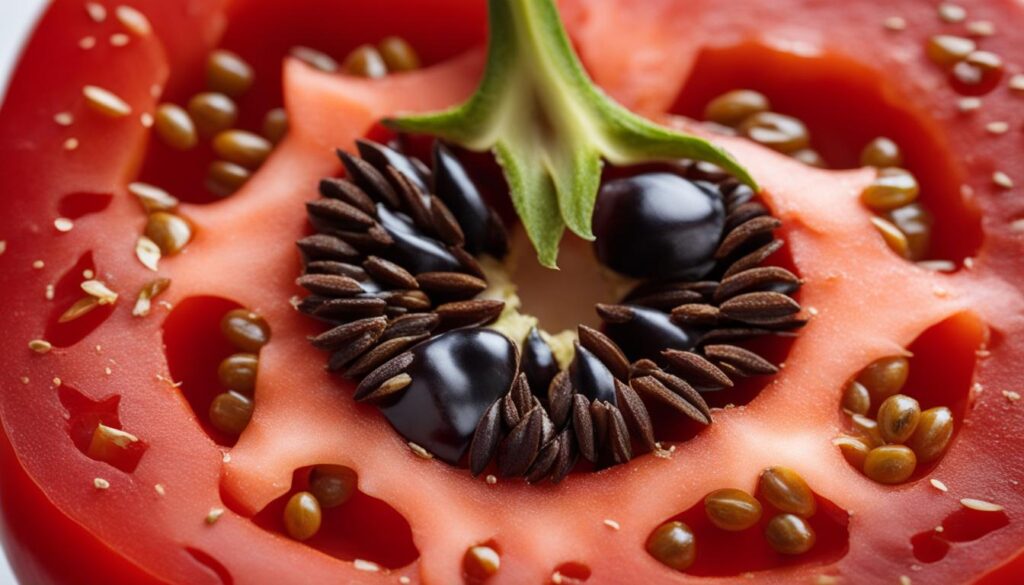
Dogs should not eat unripened tomatoes or any green tomatoes. Unripened tomatoes contain higher concentrations of tomatine, which can be toxic to dogs if consumed in large amounts. It’s important to prevent your dog from eating unripened tomatoes or the stems of tomato plants, as they can make your dog sick.
While ripe tomatoes are generally safe for dogs, unripened tomatoes pose a risk due to their higher levels of tomatine. Tomatine is a natural compound found in tomatoes, especially in green or unripened ones. In dogs, consuming a significant amount of tomatine can lead to symptoms such as gastrointestinal upset, weakness, and even cardiac effects in severe cases.
Tomatoes go through various stages of ripeness, from green to red. During this process, the levels of tomatine decrease, making ripe tomatoes safer for dogs to consume. However, unripened tomatoes, whether green or still yellow, contain higher concentrations of tomatine and should be avoided.
To prevent any potential health issues, it’s essential to ensure that your dog doesn’t have access to unripened tomatoes or the stems of tomato plants in your garden. Keep an eye out for any fallen tomatoes or plants, especially during the growing season, and promptly remove them from your dog’s reach.
If you suspect that your dog has consumed unripened tomatoes or is showing any signs of illness, it’s crucial to contact your veterinarian immediately. They can provide guidance on potential next steps and advise on any necessary treatments.
Can Dogs Eat Tomato Soup?
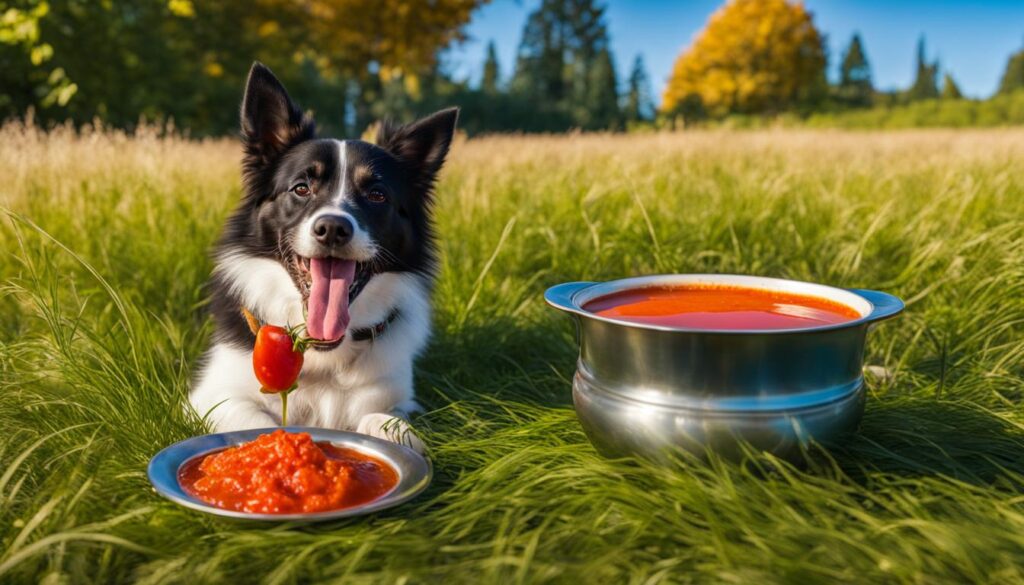
Feeding your dog tomato soup may not be the best idea, especially if it contains additional ingredients like garlic, onion, or spices. Tomato soup often has a high sugar and salt content, which can be harmful to dogs if consumed in large amounts. As a responsible pet owner, it’s best to avoid feeding tomato soup to your furry companion.
Rather than tomato soup, you can safely feed your dog ripe tomatoes as a healthier alternative. Ripe tomatoes provide essential vitamins and minerals, such as vitamins A and C, potassium, and antioxidants. These nutrients can support your dog’s immune health, muscle function, and help reduce the risk of illness.
However, it’s important to remember that the myth that tomatoes are harmful to dogs stems from confusion around tomatine, a compound found in tomatoes. The amount of tomatine in ripe tomatoes is not significant enough to cause harm to dogs.
For a quick reference, here is a comparison of tomato soup and ripe tomatoes:
| Tomato Soup | Ripe Tomato | |
|---|---|---|
| Sugar Content | High | Low |
| Salt Content | High | Low |
| Additional Ingredients | Garlic, onion, spices | N/A |
| Nutritional Benefits | Limited | Vitamins, minerals, antioxidants |
As you can see, ripe tomatoes are a much better choice for your dog’s overall health. However, remember that moderation is key. Too many tomatoes in your dog’s diet can lead to digestive upset.
In the next section, we will explore how to safely feed tomatoes to dogs, ensuring their well-being and enjoyment of this nutritious fruit.
How to Safely Feed Tomatoes to Dogs
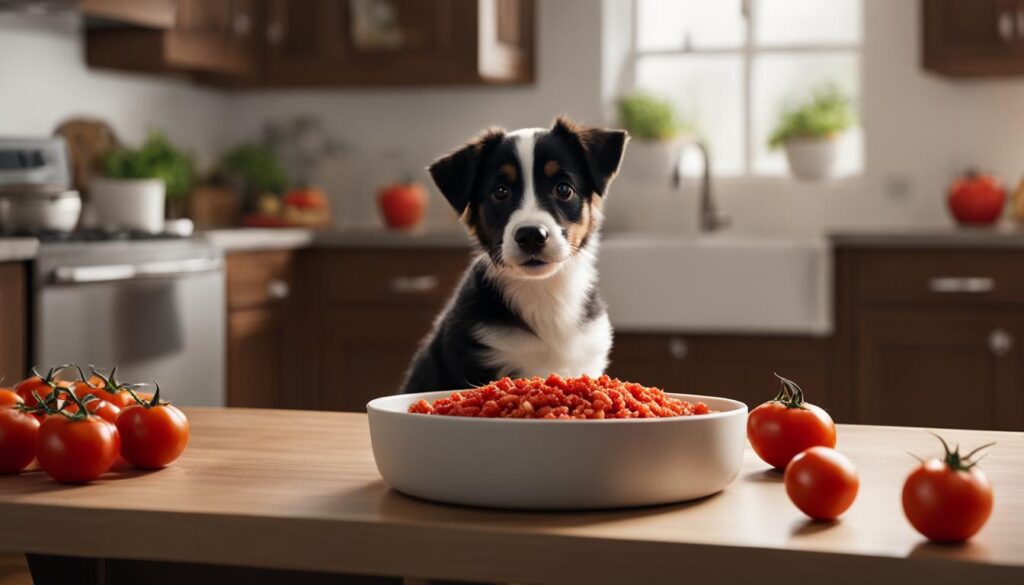
If you decide to feed your dog ripe tomatoes, it’s important to do so safely. Here are some guidelines to ensure that your furry friend can enjoy tomatoes without any harm:
- Choose ripe tomatoes with less tomatine content: Opt for fully ripened tomatoes, as they have lower concentrations of tomatine, making them safer for dogs.
- Remove stems and leaves: Before feeding tomatoes to your dog, be sure to remove all stems and leaves. These parts contain higher levels of tomatine, which can be harmful to dogs.
- Cut tomatoes into bite-size pieces: To prevent choking hazards, cut the tomatoes into small, manageable pieces. This will also make it easier for your dog to digest.
- Limit portions: While tomatoes can be a healthy addition to your dog’s diet, it’s important not to overdo it. Limit tomato consumption to no more than 10% of your dog’s daily caloric intake.
- Monitor for adverse reactions: After feeding tomatoes to your dog, keep a close eye on any potential digestive problems or allergic reactions. If you notice any adverse symptoms, consult your veterinarian.
By following these safety measures, you can ensure that your dog can enjoy the benefits of tomatoes without any negative effects.
The Benefits of Feeding Tomatoes to Dogs
Tomatoes can provide several health benefits for dogs. They are a good source of vitamins A and C, potassium, and antioxidants. These nutrients are essential for immune health, muscle function, and overall wellbeing. However, it’s important to feed tomatoes in moderation and in a safe manner to avoid any potential risks.
Other Fruits Safe for Dogs
Apart from tomatoes, there are other fruits that are generally safe for dogs to eat in moderation. Incorporating a variety of fruits into your dog’s diet can provide them with additional nutrients and flavors. Here are some examples of fruits that are safe for dogs:
Apples: Apples are a great source of vitamins A and C, fiber, and antioxidants. Be sure to remove the seeds and core before feeding apples to your dog.
Bananas: Bananas are a nutritious snack that is rich in potassium, fiber, and essential vitamins. They can also help with digestion and provide natural energy.
Blueberries: Blueberries are packed with antioxidants and phytochemicals that can promote overall health and boost the immune system. They are also low in calories and high in fiber.
Watermelon: Watermelon is a hydrating fruit that contains vitamins A, B6, and C. It is also low in calories and a great source of antioxidants.
When introducing new fruits to your dog’s diet, it’s important to do so gradually and in moderation. Start with small amounts and observe your dog for any signs of digestive upset or allergies. If your dog has any existing health conditions or dietary restrictions, it’s recommended to consult with your veterinarian before incorporating new fruits into their diet.
Potential Risks of Tomatoes for Dogs
While ripe tomatoes are generally safe for dogs, it’s important to be aware of potential risks. Dogs should not consume the stems, leaves, or unripened tomatoes, as these can contain higher concentrations of tomatine and solanine, which can be toxic to dogs. Additionally, tomatoes should not be given to dogs with arthritic conditions, as they can worsen joint problems and interfere with calcium consumption.
Dogs love the taste of tomatoes, but it’s important to know that not all parts of the tomato are safe for our furry friends. Tomatoes contain compounds like tomatine and solanine, which can be harmful to dogs in excessive amounts. The stems, leaves, and unripened tomatoes have higher concentrations of these compounds, making them unsafe for dogs to consume. These compounds can cause digestive issues, weakness, and even toxic reactions in dogs.
In addition, dogs with arthritic conditions should avoid tomatoes. Tomatoes contain a substance called oxalates, which can interfere with calcium absorption and worsen joint problems in dogs with arthritis.
It’s always best to consult with your veterinarian before introducing tomatoes or any new food into your dog’s diet. They can provide personalized advice based on your dog’s specific needs and health conditions. Your veterinarian can also recommend alternative foods or treats that are safe and appropriate for your dog.
Cooking and Feeding Tomatoes to Dogs
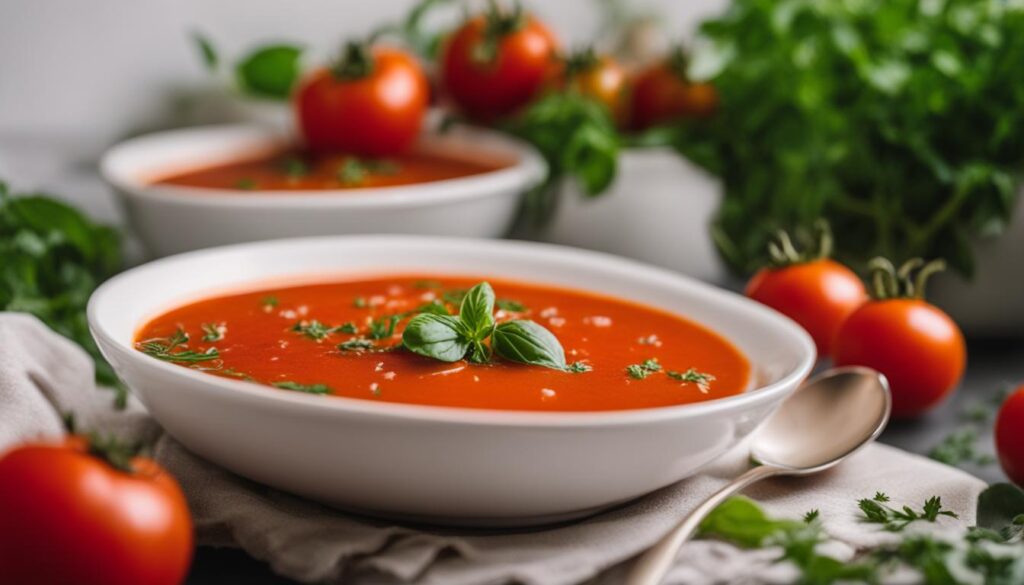
When it comes to feeding tomatoes to your furry friend, cooking them can help reduce the risk of toxins, such as tomatine, while still providing the health benefits of antioxidants and vitamins. If you choose to incorporate tomatoes into your dog’s diet, it is essential to opt for fresh, ripe tomatoes from the local market and cook them before feeding.
Cooking the tomatoes helps break down the natural compounds that can be potentially harmful to dogs, making them safer to consume. By cooking the tomatoes, you can ensure the safety of your dog while still providing them with the nutritional benefits that tomatoes offer.
There are various ways to cook tomatoes for your dog. You can steam, boil, bake, or even puree them. However, it is vital to avoid using any additional ingredients like salt, spices, garlic, or onion, as these can be harmful to dogs.
To introduce cooked tomatoes into your dog’s diet, start by offering small amounts and gradually increasing the quantity over time. This approach allows you to monitor your dog for any adverse reactions or digestive issues. Remember that every dog is different, so it’s essential to pay attention to your dog’s individual tolerance and preferences.
Feeding cooked tomatoes to dogs can be a safe and healthy addition to their diet.
What to Do If Your Dog Eats Too Many Tomatoes
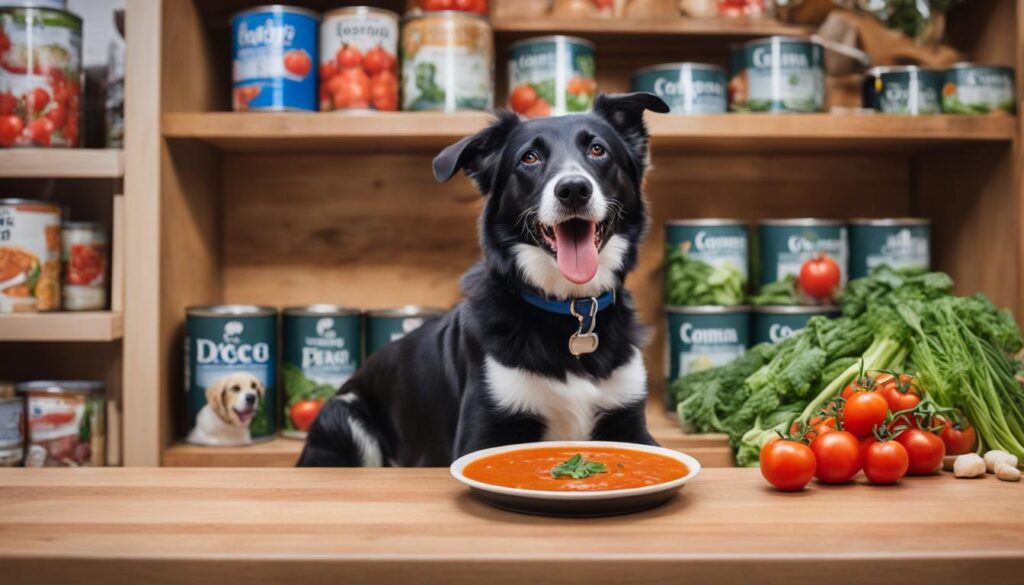
If your dog consumes an excessive amount of tomatoes or exhibits symptoms of tomatine intoxication, such as diarrhea, vomiting, or weakness, I recommend seeking immediate veterinary care. Although the consumption of a large quantity of tomatoes is unlikely to be fatal, prompt veterinary attention can help prevent or address any potential health issues.
Tomatoes contain compounds like tomatine and solanine, which can be toxic to dogs in high concentrations. Ingesting too many tomatoes can potentially lead to gastrointestinal upset and other adverse reactions. Therefore, it is crucial to monitor your dog’s tomato intake and seek professional guidance if you suspect ingestion of excessive amounts.
Tomatine Intoxication Symptoms:
- Diarrhea
- Vomiting
- Weakness
It’s important to remember that while tomatoes are generally safe for dogs, moderation is key. If you suspect your dog has consumed an excessive amount of tomatoes or is experiencing symptoms of tomatine intoxication, do not hesitate to consult your veterinarian.
When contacting your veterinarian, provide them with detailed information, such as the quantity and type of tomatoes your dog has ingested, along with any observed symptoms. This information will assist them in making an accurate diagnosis and determining the most suitable course of treatment.
| Veterinary Recommendations | Actions to Take |
|---|---|
| Contact your veterinarian | Seek immediate veterinary care if necessary |
| Provide detailed information | Inform your veterinarian about the amount and type of tomatoes consumed |
| Monitor symptoms | Keep an eye on your dog’s condition and report any changes to your veterinarian |
Note: The image above is for illustrative purposes only and does not depict actual tomato soup for dogs.
Veterinarian’s Advice on Tomato Consumption for Dogs
To ensure the safety and well-being of your dog when it comes to tomato consumption, it’s always best to consult with your veterinarian. They can provide personalized advice based on your dog’s specific health conditions, age, and dietary needs. Your veterinarian can also recommend alternative foods or treats that are safe and appropriate for your dog.
When it comes to feeding tomatoes to dogs, it’s important to consider individual factors such as your dog’s overall health, any medical conditions they may have, and their dietary restrictions. While ripe tomatoes are generally safe for dogs, it’s crucial to understand how to properly introduce them into your dog’s diet to avoid any potential risks.
Some dogs may have allergies or sensitivities to certain foods, including tomatoes. It’s essential to be vigilant and observe your dog for any adverse reactions after feeding them tomatoes. If you notice any signs of digestive upset, such as vomiting, diarrhea, or changes in appetite, it’s recommended to stop feeding tomatoes and consult with your veterinarian.
While tomatoes can provide essential vitamins and minerals, including vitamins A and C, potassium, and antioxidants, they should not be considered as a staple food in a dog’s diet. Treat tomatoes as an occasional addition to your dog’s meals, and always feed them in moderation.
If you have any concerns or questions about feeding tomato soup to dogs, it’s best to err on the side of caution and avoid it altogether. Tomato soup often contains additional ingredients like garlic, onion, or spices, which can be harmful to dogs. Moreover, tomato soup tends to have high sugar and salt content, which can be detrimental to your dog’s health if consumed regularly or in large quantities.
In summary, while ripe tomatoes can be safely incorporated into a dog’s diet, it is always advisable to consult with your veterinarian first. They can guide you on safe and appropriate ways to include tomatoes in your dog’s meals without compromising their health. Remember, your veterinarian is the best resource for tailored advice and dietary recommendations based on your dog’s specific needs.
Wrapping Up
In conclusion, while ripe tomatoes are generally safe for dogs to eat, it’s important to approach their consumption with caution. Always consult with your veterinarian before introducing any new foods into your dog’s diet, including tomato soup. Tomato soup, especially if it contains ingredients like garlic, onion, or spices, should be avoided as these can be harmful to your furry friend.
When feeding tomatoes to your dog, it’s essential to remove the stems and leaves, as they contain higher concentrations of tomatine. Additionally, limit the portions to ensure that tomatoes do not make up more than 10% of your dog’s daily caloric intake. Watch out for any signs of digestive problems or adverse reactions, and seek veterinary care immediately if your dog consumes an excessive amount of tomatoes or shows symptoms of tomatine intoxication.
While tomatoes can provide nutritional benefits such as vitamins and antioxidants, it’s important to remember that no single food should comprise the entirety of your dog’s diet. As with any new food, moderation is key. Always prioritize the well-being and overall health of your furry companion by following the guidance of your veterinarian.
FAQ
Is Tomato Soup Safe for Dogs?
Before giving your dog any new foods, including tomato soup, it’s important to consult with your veterinarian. Factors such as your dog’s age, health history, health conditions, and diet can determine whether tomato soup is safe for your dog. Additionally, dogs on prescription diets should not be fed any food or treats outside of their designated diet.
Can Dogs Eat Ripe Tomatoes?
Ripe tomatoes are generally safe for dogs to eat, including tomato soup made with ripe tomatoes. Ripe tomatoes contain essential vitamins and minerals, such as vitamins A and C, potassium, and antioxidants, which can support immune health, muscle function, and reduce the risk of illness. It’s important to note that the myth that tomatoes are harmful to dogs stems from confusion around tomatine, a compound found in tomatoes. However, the amount of tomatine in ripe tomatoes is not significant enough to cause harm to dogs.
Can Dogs Eat Unripened Tomatoes?
Dogs should not eat unripened tomatoes or any green tomatoes. Unripened tomatoes contain higher concentrations of tomatine, which can be toxic to dogs if consumed in large amounts. It’s important to prevent your dog from eating unripened tomatoes or the stems of tomato plants, as they can make your dog sick.
Can Dogs Eat Tomato Soup?
Tomato soup can be unsafe for dogs, especially if it contains additional ingredients like garlic, onion, or spices. Tomato soup often contains high sugar and salt content, which can be harmful to dogs. It’s best to avoid feeding your dog tomato soup and opt for feeding them ripe tomatoes instead.
How to Safely Feed Tomatoes to Dogs
If you decide to feed your dog ripe tomatoes, it’s important to do so safely. Choose ripe tomatoes that have less tomatine content and are easier for dogs to digest. Remove the stems and leaves of the tomato before feeding it to your dog, as these parts have higher concentrations of tomatine. Cut the tomato into bite-size pieces to avoid choking hazards and limit the portions to ensure that it doesn’t make up more than 10% of your dog’s daily caloric intake. Monitor your dog for any adverse reactions such as digestive problems or allergic reactions.
What Other Fruits Are Safe for Dogs?
Apart from tomatoes, there are other fruits that are generally safe for dogs to eat in moderation. Some examples include apples, bananas, blueberries, and watermelon. However, it’s important to introduce new fruits slowly into your dog’s diet and monitor for any signs of digestive upset. It’s always best to consult with your veterinarian before introducing any new food to your dog’s diet.
What Are the Potential Risks of Tomatoes for Dogs?
While ripe tomatoes are generally safe for dogs, it’s important to be aware of potential risks. Dogs should not consume the stems, leaves, or unripened tomatoes, as these can contain higher concentrations of tomatine and solanine, which can be toxic to dogs. Additionally, tomatoes should not be given to dogs with arthritic conditions, as they can worsen joint problems and interfere with calcium consumption.
Can Dogs Eat Cooked Tomatoes?
Cooking tomatoes can help reduce the risk of toxins, such as tomatine, without compromising the health benefits of antioxidants and vitamins. If you choose to give your dog tomatoes, opt for fresh, ripe ones from the local market and cook them before feeding. This can help ensure the safety of your dog while still providing them with the nutritional benefits of tomatoes.
What Should I Do If My Dog Eats Too Many Tomatoes?
If your dog eats too many tomatoes or shows symptoms of tomatine intoxication, such as diarrhea, vomiting, or weakness, it’s important to seek veterinary care immediately. While the consumption of a large amount of tomatoes is unlikely to be fatal, prompt veterinary attention can help prevent or address any potential health issues.
What Is the Veterinarian’s Advice on Tomato Consumption for Dogs?
To ensure the safety and well-being of your dog when it comes to tomato consumption, it’s always best to consult with your veterinarian. They can provide personalized advice based on your dog’s specific health conditions, age, and dietary needs. Your veterinarian can also recommend alternative foods or treats that are safe and appropriate for your dog.
Wrapping Up
While ripe tomatoes are generally safe for dogs to eat, it’s important to exercise caution and follow the recommendations provided by your veterinarian. Tomato soup, especially if it contains additional ingredients like garlic, onion, or spices, should be avoided. Always monitor your dog for any signs of digestive problems or adverse reactions when introducing any new food into their diet. Remember, consulting with your veterinarian is essential to ensure the overall health and well-being of your furry companion.


